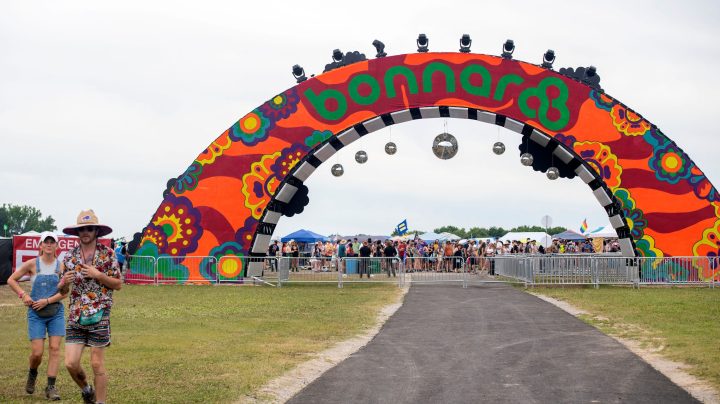
Some music festivals are allowing overdose reversal drugs

A 26-year-old was found dead in his campsite at Bonnaroo Music and Arts Festival in 2019. The toxicology report linked his death to a grim trend that has only worsened since his passing. In his system were both ecstasy and fentanyl — a dangerous combination, especially if someone is unaware they’re taking a highly potent synthetic opioid.
Attendees at multi-day concert festivals like Bonnaroo, held on an isolated farm in Coffee County, Tennessee, don’t have too much trouble sneaking pills and powders past security. And more and more, those party drugs can be laced with potent fentanyl, which is why medics now carry the overdose reversal drug naloxone. But the first responders can’t be everywhere, and the medication needs to be administered quickly. Often, the work of handing out naloxone is being done by volunteers and nonprofits.
“We are showing up with it in huge quantities … and proactively hand this out,” said Ingela Travers-Hayward, whose Ohio-based nonprofit This Must Be The Place is now flooding festivals with the life-saving nasal spray.
Naloxone was once frowned upon by festivals and even banned by some. But even with the growing acceptance, harm reduction — in its many forms — is far from full acceptance.
Travers-Hayward is crisscrossing the country this summer distributing Kloxxado donated by the manufacturer, Hikma Pharmaceuticals.
Very few people pack reversal medication, and it can be difficult to track down free doses. “What we’re learning is that all of these people know what naloxone is. They’ve even known people who have come back to life because of naloxone,” Travers-Hayward said. “But we are able to be the people who give them their actual first kit.”
For those willing to buy it, even the generics can be expensive. And name-brand reversal drug kits cost more than $100 without insurance.
Travers-Hayward and a team of volunteers handed out 2,500 doses at this year’s Bonnaroo.
Public health agencies increasingly recommend that even non drug users carry naloxone. But often the government takes a back seat in carrying out so-called “harm reduction,” relying on nonprofits and volunteers.
“It’s a fine line to walk and health departments try to stay within the bounds of the law while also communicating actively, trying to get good public health education out there,” said Lori Tremmel Freeman, CEO of the National Association of County and City Health Officials.
Laws and policies vary by state. Naloxone, for instance, remains a prescription drug, so handing it out can mean relying on Good Samaritan laws that shield organizations and individuals from legal liability.
And it is still taboo among concert promoters to help users test their drugs for fentanyl. Companies don’t want to be seen as condoning drug use. But they’re also navigating a legal gray area and battling public perceptions.
Fentanyl test strips have been considered drug paraphernalia by some states. Tennessee just decriminalized them this year. But big-time festivals still don’t welcome them publicly.
“They have in the past given us a long list of insurance requirements… and we have scoured the planet, I kid you not, for underwriters that will insure us in this circumstance,” said the founder of Bunk Police who goes by the pseudonym Adam Auctor. His company sells test kits at festivals, often under cover.
He doesn’t use his real name because part of his role is tracing back laced drugs and convincing dealers to destroy their entire supply.
Auctor, who said he has been kicked out of Bonnaroo twice, now sneaks into festivals a few days early, parking his truck filled with thousands of test kits in the woods to evade security until he can blend into the crowd.
“We barely even ask for permission to come any more,” he said. “We know they will say no to us.”
But there is great need, Auctor said.
“Drug checking is not an option anymore,” said Mitchell Gomez, executive director of DanceSafe. “It’s a thing that anyone who uses substances has to do.”
DanceSafe follows rules set by promoters, though Gomez does not reveal which festivals are cooperative. Where allowed, the nonprofit sets up a tent with a tabletop machine that screens drugs for fentanyl.
Fentanyl overdoses — often from laced substances — are now the top cause of death for Americans age 18 to 45. The escalating crisis is softening more promoters, Gomez said, but not all.
Live Nation, which is majority owner of Bonnaroo and among the largest concert promoters in the world, didn’t respond directly to questions about allowing fentanyl testing, saying by email that Bonnaroo is always looking for ways “to take care of and educate our patrons.”
While corporate legal teams remain leery, Gomez said he sees potential liability working both directions.
“If somebody dies at your event from something DanceSafe could have prevented, and we reached out to you about being on site and you turned us down, I actually think that probably created some liability as well,” he said.
Sometimes he’s welcomed at a festival but banned from checking drugs. So Gomez hands out information about the dangers of fentanyl and earplugs — a non-controversial form of music festival harm reduction.
There’s a lot happening in the world. Through it all, Marketplace is here for you.
You rely on Marketplace to break down the world’s events and tell you how it affects you in a fact-based, approachable way. We rely on your financial support to keep making that possible.
Your donation today powers the independent journalism that you rely on. For just $5/month, you can help sustain Marketplace so we can keep reporting on the things that matter to you.











